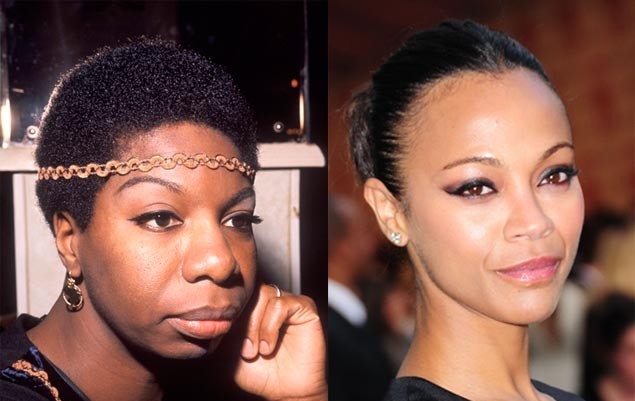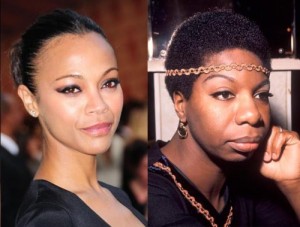By Ariel Worthy
Times staff writer

As biopics go, “Nina” may be one of the most talked about and controversial biographical films in recent memory—and it won’t even be in theaters for another month.
When the trailer was released for the upcoming film about the late singer and activist Nina Simone, otherwise known as “The High Priestess of Soul,” people wasted no time criticizing its production, mainly citing the casting of actress Zoe Saldana in the role of Simone.
“Cool story but please take Nina’s name out your mouth. For the rest of your life” came a tweet from Simone’s official Twitter account. It is unclear who is running the singer’s Twitter account, but her relatives said a family friend, Aaron Overfield, managed the official website and Facebook page years ago.
Much of the controversy has circled around the fact that Saldana, a fair-skinned actress with a narrow nose, was chosen to play Simone, who had a rich, dark complexion and broad nose. For the film, makeup artists darkened Saldana’s skin and fit the actress with a prosthetic nose.
Singer India.Arie said Saldana “looks like a person in blacker face” in an open letter expressing her disappointment with the film.
“Nina,” which will be in theaters on April 22, is just one of three upcoming biopics about African Americans that have generated national interest.
“Miles Ahead,” starring Don Cheadle as jazz icon Miles Davis, will be in theaters on April 1. And director Nate Parker’s “The Birth of a Nation,” about Nat Turner’s 1830s slave rebellion, will be in theaters this fall. The latter sold for a record $17.5 million at the Sundance Film Festival in January 2016.
Casting Outcry
Biopics are a mainstay for moviegoers, and the films often have been known to define the careers of actors. Remember the acclaimed performances of Jamie Foxx as singer Ray Charles in “Ray” and George C. Scott as U.S. Gen. George S. Patton in “Patton”?
None of those roles sparked an outcry about the casting choice for the lead character, however. It’s different for “Nina.”
Nina Simone was famous her music and Civil Rights activism from the 1950s to the 1970s. Much of the controversy surrounding the film about her extraordinary life revolves around the fact that Saldana looks nothing like Simone, who was proud of her features.
When the casting was announced in 2012 Simone’s daughter, Lisa Simone Kelly, said, “… appearance-wise, this is not the best choice.”
“My mother was raised at a time when she was told her nose was too wide, her skin was too dark,” Kelly said in a 2012 interview with the New York Times.
Ayana Turner, lead journalist for iPUSH magazine, said, “People are so used to Hollywood wanting to put the fair-skinned people in front of the camera. It’s been this way since Harry Belafonte. I think it’s like saying if you’re not fair skinned you won’t be accepted.”
“I think it’s a fair argument from India.Arie,” Turner added. “It’s the old paper bag syndrome, where if you’re not light, you’re not considered beautiful.”
India.Arie suggested other people who could have played Simone, like Simone’s daughter.
Not everyone feels that way, though.
“I want to give Saldana a standing ovation because if you are able to portray someone you look nothing like and do it well, kudos to you,” said WJLD radio host Eyrika Parker. “She should be judged on how well she does in the movie, not what she looks like.”
Other Actresses
Many people online have suggested other black actresses that could have better portrayed Nina Simone, including Emmy-winning actresses Viola Davis and Uzo Aduba and singer India.Arie. Originally, hip-hop diva Mary J. Blige was slated to star in the film, but she dropped out last year after shooting was delayed.
“In my opinion it could have gone to someone like Lauryn Hill,” Turner suggested. “She’s very familiar with Simone. She’s mentioned [Simone] numerous times in her music. She has that consciousness like Simone. She has darker skin and fuller lips like Simone. Saldana is a great actress, but at the end of the day she could have declined the role.”
“I’m sure if those people wanted that role they would have gone after it,” Parker said. “The casting call was out there, and they could have gone for it. I’m not necessarily ready to blame the casting crew for it.”
The film’s director Cynthia Mort could have gotten her family involved, Turner said: “You have to be careful with movies like that because if it’s not right the family can come after you. I wouldn’t be surprised if there are some big lawsuits that come from this.”
Parker feels differently: “If the struggle is the same, then it’s the point you want to take from the movie, not necessarily the day-to-day actions of Simone. If I can inspire you, to heck with my grammar and diction. If the message got across, then that’s what matters.”
More than Skin Deep
In a National Public Radio (NPR) interview, Lanita Jacobs, who teaches anthropology at the University of Southern California and often lectures on how African Americans are portrayed in film and on television, says casting the fair-skinned Saldana then darkening her with makeup and giving her a prosthetic nose and an Afro wig, is particularly offensive to women who have had to struggle with acceptance because of their own dark complexions.
“We understand that there are these beauty issues,” Jacobs said. “And sometimes what sanctions people’s right to speak on these kind of issues is whether they have had experiences born of what it means to have kinky hair or to have wide noses or darker skin. Nina’s music taps into a certain kind of awareness born of the way she looks.”
Parker, on the other hand, said, “The issue of the hue of our skin is an issue that is only emphasized by African Americans. The diversity in us should . . . unite, not divide.”
Kelly, Simone’s daughter, said the outrage should not lie with Saldana, but with the producers and director who put together as film that was not an accurate portrayal of her mother.
“It’s unfortunate that Zoe Saldana is being attacked so viciously when she is someone who is part of a larger picture,” Kelly told Time. “It’s clear she brought her best to this project, but unfortunately she’s being attacked when she’s not responsible for any of the writing or the lies.”





